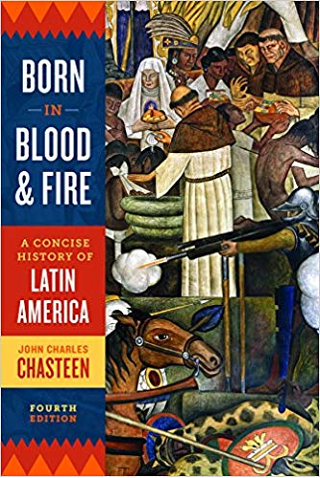Born in Blood & Fire: A Concise History of Latin America, Second Edition
Stars
4
Length
320 pages
Author
John Charles Chasteen
Eras
From 1492 to Now
Types
History

Synopsis
"Made up of 20 very different countries, Latin America has sometimes been treated as though it were a homogeneous unit, one mired in poverty and political instability. University of North Carolina scholar John Charles Chasteen's sweeping history of the region imparts a sense of how diverse--ethnically, linguistically, culturally--Latin America truly is, and of how that part of the world is rapidly changing, mostly for the better. (For example, he writes, "in 1980 most governments of the region were dictatorships of various descriptions. In 2000, elected governments rule almost everywhere.")
Chasteen observes that, although Latin America came into being under the imperial aegis of a few European powers, principally Spain and Portugal, it quickly branched into sometimes conflicting regions with widely differing ideas of economic development and government. He goes on to examine the careers of some of Latin America's most important historical figures, among them Simon Bolivar, who spread a revolutionary gospel of independence throughout the hemisphere, and Lázaro Cárdenas, the Mexican president who, in 1938, nationalized the oil industry and set his nation on a difficult course toward economic self-government. Of particular interest is Chasteen's consideration of the many reasons Latin American governments have clashed with that of the United States--among them disenchantment over the 1947 Marshall Plan, which rebuilt Germany at enormous cost, while offering almost no assistance to needy Latin American allies.
Designed as an undergraduate textbook, Chasteen's survey offers a useful overview of a region that, although of growing importance in world affairs, remains little understood." [Gregory McNamee]
See YouTube video--C-SPAN2 of author talking about the book.
Chasteen observes that, although Latin America came into being under the imperial aegis of a few European powers, principally Spain and Portugal, it quickly branched into sometimes conflicting regions with widely differing ideas of economic development and government. He goes on to examine the careers of some of Latin America's most important historical figures, among them Simon Bolivar, who spread a revolutionary gospel of independence throughout the hemisphere, and Lázaro Cárdenas, the Mexican president who, in 1938, nationalized the oil industry and set his nation on a difficult course toward economic self-government. Of particular interest is Chasteen's consideration of the many reasons Latin American governments have clashed with that of the United States--among them disenchantment over the 1947 Marshall Plan, which rebuilt Germany at enormous cost, while offering almost no assistance to needy Latin American allies.
Designed as an undergraduate textbook, Chasteen's survey offers a useful overview of a region that, although of growing importance in world affairs, remains little understood." [Gregory McNamee]
See YouTube video--C-SPAN2 of author talking about the book.
RefTags
Born in Blood & Fire
Released
2006
Location
Americas
Setting